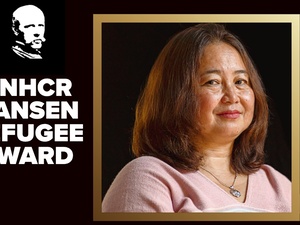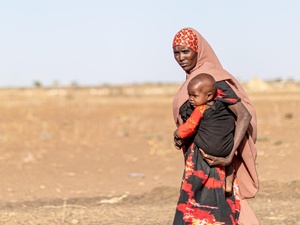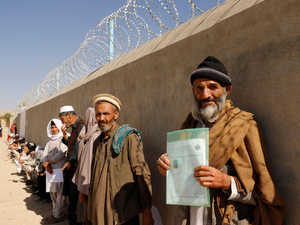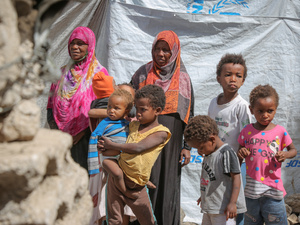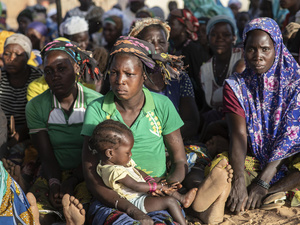UNHCR distributes winter aid to more than 200,000 needy Afghans
UNHCR distributes winter aid to more than 200,000 needy Afghans

Vulnerable Afghan families line up to receive winter supplies in Dahsabz, a suburb of Kabul.
KABUL, Afghanistan, December 27 (UNHCR) - More than 200,000 displaced Afghans are receiving urgently-needed winter supplies as night-time temperatures dip below freezing point across the impoverished country.
On Tuesday, the UN refugee agency and its partners handed out blankets, plastic sheets, warm clothes and fuel to more than 300 families in the Dahsabz district of the Afghan capital, Kabul.
"This joint winter assistance programme is vital for returnees and internally displaced people (IDPs) who are at particular risk during the cold winter months in Afghanistan," said Jamaher Anwary, the Afghan Minister of Refugees and Repatriation (MoRR).
Peter Nicolaus, UNHCR Representative in Afghanistan, listed the beneficiaries: "Households that are run by women with no adult male support, families with elderly or disabled members, families with many children. In other words, really poor or desperately disadvantaged families who are in dire need of our support."
Among them was Makai, a single mother of six who received blankets, clothes and other warm items, as well as two large sacks of coal and one large sack of flour. "These gifts mean everything to my young children and me," she told a UNHCR worker. "I am the only one old enough to bring in a bit of money, but my youngest was only born recently and I have not been able to find work because of her. Thank so very much for your support, we desperately need it."
To date, families in areas such as Nimroz, Paktika, Paktia, Zaranj, Balkh, Faryab, Samangan, Jawzjan, Sar-i-Pul and Baghlan have already received the winter assistance. Vulnerable families living in the eastern, southern and central provinces will soon be receiving theirs.
In total, some 34,500 families numbering more than 200,000 people in Afghanistan will receive supplies such as blankets, plastic sheets, sweaters, shawls, gloves, socks, waterproof shoes, gas, charcoal and coal to help them stay warm and dry through the bitter winter.
Supplies had to be purchased and pre-positioned in remote areas, such as Badghis and Ghor, where heavy snow can affect access to families in need.
As in previous years, the UN refugee agency's assistance focuses on isolated rural places of high return, hard-to-reach areas that may not be frequented by aid agencies. UNHCR has been urging donors, including those in the private sector, to direct their assistance to needy communities such as IDPs in Ghazni, or new refugee returnees arriving in Logar and Wardak.
Since the fall of the Taliban government in late 2001, UNHCR has helped some 4.6 million Afghan refugees to return home voluntarily. Nearly 3 million registered Afghan refugees are still living in exile in Pakistan and Iran today.
The current situation in Afghanistan - with a lack of jobs, food, shelter and security in parts of the country - is making it harder for returnees to remain in their villages. Refugees who want to return home have little to go back to.
Together with UNHCR, the Afghan government is engaged in a consultative process involving neighbours Iran and Pakistan to develop a multi-year solutions strategy for Afghan refugees. This strategy will be presented to the international community at a conference in April 2012.
By Mohammed Nader Farhad in Kabul, Afghanistan


